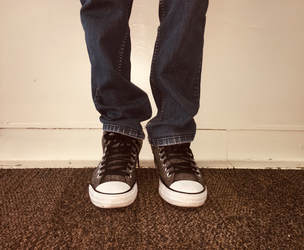- Folio No. 9
- About
- Feral Parrot : The Blog
- INTERVIEWS
- SUBMISSIONS
-
ISSUE ARCHIVE
- PRINT Chapbook No.6 Healing Arts
- Online Issue No.9
- Online Issue No.1 Fall 2016
- Online Issue No.2 Spring 2017
- ONLINE Issue No.3 Fall 2017
- PRINT Vol 72 No 2 Fall 2017
- PRINT Vol 73 No.1 Fall 2018
- ONLINE Issue No. 4 Fall 2018
- Online Issue No.5 Summer 2018
- FOLIO No.1 Fall 2018 VOTE
- ONLINE Issue No.6 Fall 2018 Fall Spirituality
- FOLIO 2 Fall 2019 Celebrating Dia De Los Muertos
- FOLIO No.3 -- Moon Moon Spring 2019
- FOLIO No.4 Celebrating New PCC Writers
- FOLIO No.5 City of Redemption
- FOLIO No.6 Spring 2020
- FOLIO No. 7 - Winter 2021 Into the Forest
- 2022 Handley Awards
- Inscape Alumni Board
- PRINT Chapbook No. 7 Healing Arts
- Blog
- Untitled
By Andrew Zapata
Poetry is a form of art, and this form of art offers everyone a platform to express themselves and to affirm their own voices. For me, my fascination with poetry began in an unlikely way. I was 18 when I started my first semester at Pasadena City College. At the time I had no intention of pursuing an academic degree, but I couldn’t let my parents know that. I always romanticized becoming a working-class dude with a blue collar job: a simple life. Wrenching on cars sounded awesome and so when I hit PCC that Fall, the only class I took was Auto 32.
My plan to ignore the more academic classes in favor of the hands-on classes was going great, but then it came time to register for another semester, and while I wasn't sure what I would take, my parents had no problem demanding that I sit down with them to make a full, educational plan for transfer to a 4-year degree. I was forced to pick what my mom called a "more serious" major. I had always enjoyed reading and writing, so I picked English. I found writing pretty enjoyable but also, I think I had some romanticized notions of being an English teacher. I had been madly in love with my high school English teacher and even went as far as asking her out! It goes without saying, we never made off into the sunset, but maybe English was still for me. After a few semesters, I landed in ENG 53 - Poetry, with Dr. Kirsten Ogden. I had always thought my own words might count for something, and in this class, I was introduced to the intimate science of poetry and the voices of so many others. One poet that I found particularly relatable turned out to be Zubair Ahmed, author of City of Rivers. I discovered in the online article “The poetics of home with Zubair Ahmed” that he and his family came to America to escape the political instability and poverty of Dhaka, Bangladesh. He was a child when they won the Diversity Visa Lottery and were granted green card access into the country. Ahmed describes Dhaka as a densely packed city to the point where he states, “When you walk down the street [in Dhaka], you breathe the breath of the person standing next to you”. I found his comment relatable as a Los Angeles native. This city has an estimated population of four-million people, I sometimes feel a similar invasion of space living here. One poem in particular that I love by Ahmed is "The Water of Lake Tahoe". Ahmed opens his poem by painting a wonderful feeling of Nirvana-like bliss. The sound of water repairs my skin. I stand inside the wind, Breathing in the tips of waves And the branches coated In pre-dawn ice. I share Ahmed’s appreciation with nature through my own love affair with poetry and mother nature. A tranquil effect coats the senses from the sound of moving water, the feel of a wind’s embrace, and breathing crisp air that only exists in the early hours of the morning forest. It is very easy to forget the therapeutic healing nature can offer, especially for those of us in the city. Like Ahmed, I too find peace and serenity when I’m outside alone. There is nothing better than having a quiet space and time away from the pollution of everyday life. Having the freedom of clear un-encroached thought is an inexplicably delightful gift from nature. The rest of this poem takes a polar opposite sentiment. The final seven lines read: I’m afraid to go anywhere. I’m afraid of the empty rooms That await me, The photos on my table That must be sorted. The heaps of paper being folded By the ghosts who refuse to haunt me. The physical world’s natural beauty is life’s man-made horror. Ahmed explains, “I’m afraid to go anywhere”. There is a sense of fear within him that relates to the confines of to the confines of 21st-century life. The rest of the poem’s tone shifts from soulful freedom to lingering thoughts of enslavement via tasks and objectives; existing only from a dominant culture of modern technological advancement of just a few centuries. Ahmed expresses fear that is all too real and relatable for anyone who’s exposed to living in Western culture/society. Life becomes synchronized and monotonous when it’s dependent on working, creating an ominous cycle of working to live and living to work. I realized that my former aspiration of becoming a labouring mechanic, clocking in and clocking out, isn’t for me. Ahmed captures the culture clash between Western vs. Eastern values. He is an Indian born Native which means he is apart of a culturally Eastern sensibility. This is represented in the first half of his poem, as nature plays a very influential role in his part of the world. The second half of the poem represents symptoms that are well known to Western culture because work and worry are unfortunately synonymous with each other. Western society values work and mutes holistic views on life. Eastern society, on the other hand, values a more holistic approach to life over a rat race mentality. In retrospect, I don’t blame myself for just wanting to start my life without an education. Like Ahmed, I find myself contemplating a life without man-made horrors. We both have an appreciation for holistic ways of healing and find our distinct voice in nature. Poetry has molded me into a more whole individual, defining my voice and perspective on life. I am so happy that I found that English 53 class with Doctor Ogden; without it, I might still have been that adolescent boy with dreams of being a day laborer.
Andrew is a student attending Pasadena City College. He says: "My admiration for the written word serve as influences to pursue an academic career in English."
To read more of Zubair Ahmed's work please visit:
https://www.poetryfoundation.org/poets/zubair-ahmed
2 Comments
alina
2/20/2024 09:57:40 pm
Spread your life enjoyment 🔥 through unique vouchers at <a href=" https://coupondonor.com/coupons/devilsfilm
Reply
7/1/2024 06:02:26 am
I've always enjoyed finding unexpected beauty in the everyday, and that's exactly what Zubair Ahmed's poetry captures for me. His background as a Bengali-American poet brings a unique perspective, and his poems about city life resonate with me on a deep level. It's refreshing to encounter a poet who can weave relatable themes into his work.
Reply
Leave a Reply. |
IMPORTANT NOTE:
PCC Inscape Magazine, housed at Pasadena City College, is following Coronavirus protocols. At this time our staff continues to read submissions and publish web content. Note:
Blog Posts reflect the opinions of the writer and not the opinions of Pasadena City College or Inscape Magazine Editorial Staff Members. Archives
December 2023
Categories
All
|




 RSS Feed
RSS Feed